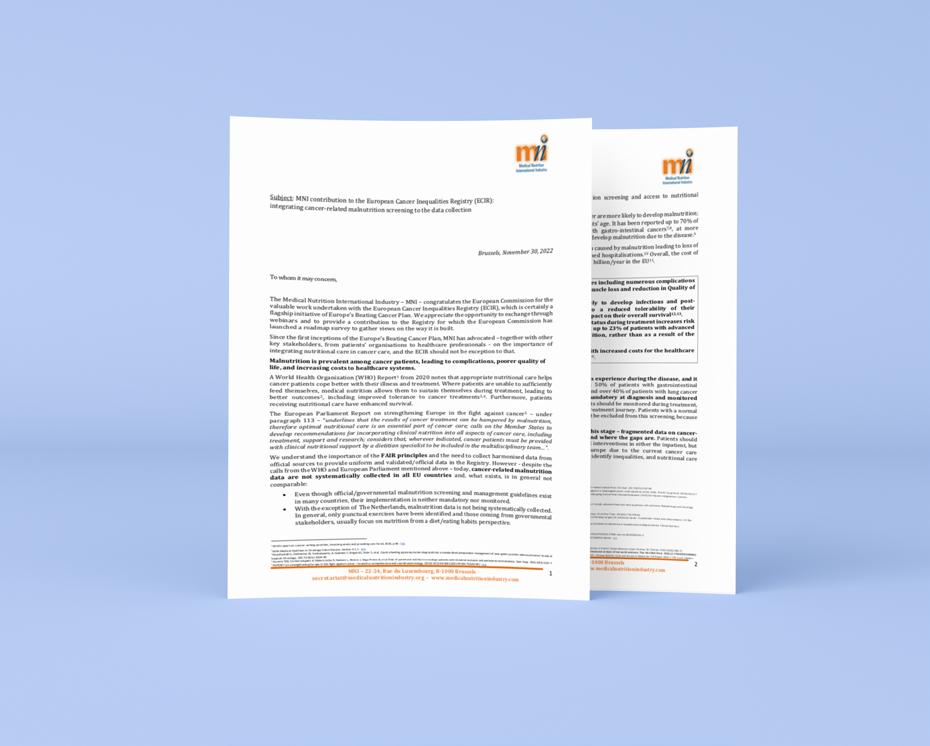
2 minute read
3. EU Public Affairs: positioning Medical Nutrition on the EU health agenda
MNI conducted a feasibility study on how to provide health indicators related to disease-related malnutrition (DRM) and assess the feasibility of collecting and sharing data on DRM in the bi-annual “Health at a Glance” report published by the EC and the Organisation for Economic Co-operation and Development (OECD) – where there is no mention of caring for malnourished patients in its various assessments and recommendations. The study concluded that there is no systematic nor consistent collection of data on DRM in the EU, contributing to inequality of nutritional care interventions. As a result, MNI will work with its members and communicate with the EC to share knowledge in the field.
MNI contributed to the EC consultation on non-communicable diseases, sharing its views on priorities for action in caring for patients with non-communicable diseases, examples of effective policies, best practices, promising approaches, and leads on how the medical nutrition sector can best collaborate with public health authorities and other parties3
Advertisement
MNI also answered the EU consultation on the revision of the Critical Raw Material (CRM) act, highlighting the need to include in the list essential ingredients that are necessary to care for people, in addition to the sustainable functioning of the European economy. We also underlined that, when defining priorities and objectives for EU actions and determining strategic CRMs based on pre-set criteria, EU legislators should consider the absolute need for these materials, and the absence of any replacements. For some components of medical treatment there are no alternatives, hence a lack of access to these CRMs (because of insufficient contingency planning) often results in a complete lack of any treatment options and therefore the deterioration of the patient’s health.
Jointly with ESPEN and the European Nutrition for Health Alliance (ENHA), two cancer-related online events were held during the ESPEN Congress in 2020 and 2021. As part of the nutritional care community efforts, MNI advocated for the inclusion of medical nutrition in the European Parliament’s Committee on Cancer (BECA) Report published in February 20224 and we were pleased to see that it:
• includes a paragraph on malnutrition
• refers to nutritional support
• requests the inclusion of nutritionist/dietitian in multidisciplinary teams
• promotes nutritional support as a human right (and ESPEN will include it in the review of the ESPEN Oncology guideline).
The final Europe’s Beating Cancer Plan published by the EC in 2021 acknowledged the importance of nutritional support, which is proven to help cancer patients cope better with illness and treatment, including the following measures:
• Building a qualified healthcare workforce, promoting the ‘Inter-specialty cancer training programme’
• Underlining the importance of a multidisciplinary workforce and calling for more dietitians/nutritionists in oncology wards
• Stressing the importance to provide supportive care to cancer patients.
This allowed for MNI to be acknowledged as an official stakeholder by the EC for consultation, including in the current implementation phase. Accordingly, MNI is contributing via webinars and open consultations.
Finally, MNI responded to the EC consultation on a future European Cancer Inequalities Registry5 , highlighting the absence of systematic and harmonised EU-wide collection of data on disease-related malnutrition and cancer, despite clear guidelines on the topic. This creates inequalities in malnutrition screening and access to nutritional interventions across the EU.





